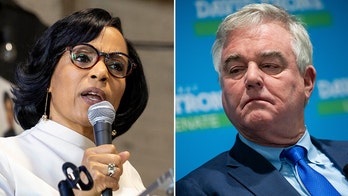
Shown here is Rep. Mike Rogers, R-Mich.
Editor's note: The following is the latest installment in "Movers and Shakers: Republican Leadership in the 112th Congress." The FoxNews.com series looks at some of the newly prominent House Republicans who will decide GOP and legislative priorities in the next Congress.
The war on terror didn't much factor into the 2010 midterm elections. But if Rep. Mike Rogers has his way, Congress is going to start paying a lot more attention to the way the Obama administration is prosecuting that war.
The Michigan Republican, who since last year has been howling about the president's alleged law enforcement-approach to battling extremists, is set to chair the House Intelligence Committee when Congress convenes for its next session. In the new role, Rogers will no longer be just the nagging voice at the end of Washington newspaper articles about administration anti-terror policies. He'll be leading the charge against those policies.
"We went from an intelligence-based approach to a law enforcement-based approach, and we really never asked the question, 'Are we safer?'" Rogers told Fox News.
As a former FBI agent and Army officer, Rogers has some unshakable views about combatant interrogation. He says he by no means supports torture, but argues that the United States has made it too easy for its enemies to clam up by broadcasting its playbook -- the Army Field Manual -- to the world. That manual limits interrogators to 19 techniques, which Rogers said are too restrictive.
"Remember, an FBI agent can use certain psychological techniques against a gangster in New York City that the Army Field Manual would not allow a CIA case officer to use on a foreign terrorist sent here to blow up Americans," he said. "There's a contradiction here that we have to get to the bottom of."
Rogers has some specific targets in mind in seeking a course correction. Among his first orders of business in 2011 will be to try to disband the High-Value Interrogation Group -- or HIG -- the specialty team of interrogators President Obama assembled to fly around the world and question suspected terrorists after they're captured.
He called the group a political creation which hasn't achieved results and is costing taxpayers a fortune. He described the group as another layer of bureaucracy which gets in the way of case officers trying to extract information.
The president's push for the group suffered an embarrassment in the wake of the failed Christmas Day attack in December 2009. Dennis Blair, the director of national intelligence at the time, acknowledged after the fact that the not-yet-off-the-ground HIG did not interrogate the suspect and should have (though he later walked back that remark). Rogers said the administration missed another opportunity when the agents who did interrogate Umar Farouk Abdulmutallab read him his Miranda rights, costing them "valuable information."
Though the practice of Mirandizing terror suspects started under the Bush administration, Rogers has long criticized the procedure, saying it ties the hands of intelligence agents. "Those kinds of things can get hindered when a law enforcement agent says, 'Hey, you have the right to remain silent, oh by the way, if you can't afford a lawyer, we'll give you one, courtesy of the U.S. taxpayer,'" he said.
Rogers also says he will take a hard look at whether the position of director of national intelligence is necessary -- saying he's not taking off the table the prospect of eliminating the position or at least overhauling the agency that was created after the Sept. 11 attacks to coordinate intelligence. The recent incident in which Director of National Intelligence James Clapper did not know about some high-profile terror arrests in London should give lawmakers pause, Rogers said.
The Obama administration has defended Clapper, saying he was busy with other pressing matters on the day of those arrests and that his staff simply hadn't briefed him.
Rogers said there may be some benefit in having a single coordinating agency but expressed concern that it creates "more inboxes, more bureaucracy" without making progress toward finding Al Qaeda suspects.
Fox News' Jennifer Griffin contributed to this report.




